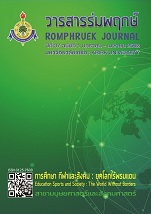Private Secondary School Management Strategies According to the Concept of Developing the Students’ Agile Leadership
Main Article Content
Abstract
The research objectives were to develop private secondary school management strategies according to the concept of developing the students’ agile leadership. The research applied an explanatory sequential mixed methods design. The samples were private secondary schools. The research instruments were questionnaires and strategic evaluation form to testify feasibility and appropriateness of the strategies. The data were analyzed by percentage, frequency, mean, standard deviation and PNI modified
The research finding reveals that private secondary school management strategies according to the concept of developing the students’ agile leadership consisted of 3 main strategies: 1) Enhance the effectiveness of management, measurement and evaluation to develop student’ agile leadership with 2 sub strategies. 2) Raise the level of instructional management to develop student’ agile leadership with 2 sub strategies. 3) Modify school curriculum to develop student’ agile leadership with 2 sub strategies.
Article Details
Every article published in the Romphruek Journal of the Humanities and Social Sciences is the opinion and point of view of the authors. Thery're not the viewpoint of Krirk University or the editored department. Any part or all of the articles for pablication must be clearly cited.
References
กฎกระทรวงกำหนดหลักเกณฑ์และวิธีการกระจายอำนาจการบริหารและการจัดการศึกษา พ.ศ. 2550.
ราชกิจจานุเบกษา. เล่มที่ 124 ตอนที่ 24ก, หน้า 29-36.
กมล ภู่ประเสริฐ. (2544). การบริหารงานวิชาการในสถานศึกษา. กรุงเทพฯ : ทิปส์พับบลิเคชั่น.
กระทรวงศึกษาธิการ. (2552). คู่มือการปฏิบัติงานข้าราชการครู. กรุงเทพฯ : ชุมนุมสหกรณ์การเกษตรแห่งประเทศไทย.
กานต์ธีรา ปัญจะทองคำ. (2557). การพัฒนาหลักสูตรฝึกอบรมภาวะผู้นำสำหรับนักเรียนชั้นมัธยมศึกษาตอนปลาย
สำหรับนักเรียนชั้นมัธยมศึกษาตอนปลาย. คณะครุศาสตร์ มหาวิทยาลัยราชภัฏเทพสตรี, ลพบุรี.
กิติมา ปรีดีดิลก. (2532). การบริหารและการนิเทศการศึกษาเบื้องต้น. กรุงเทพฯ : อักษราพิพัฒน์.
ปรียาพร วงศ์อนุตรโรจน์. (2554). การบริหารวิชาการ. กรุงเทพฯ : พิมพ์ดี.
ภารดี อนันต์นาวี. (2557). หลักการ แนวคิด ทฤษฎี ทางการบริหารการศึกษา. (พิมพ์ครั้งที่ 5). ชลบุรี : สำนักพิมพ์มนตรี.
รุ่งชัชดาพร เวหะชาติ. (2550). การบริหารงานวิชาการสถานศึกษาขั้นพื้นฐาน. (พิมพ์ครั้งที่ 1).
สงขลา : ศูนย์หนังสือมหาวิทยาลัยทักษิณ.
สมาน อัศวภูมิ. (2557). การบริหารสถานศึกษาตามแนวการปฏิรูปการศึกษายุคใหม่(ฉบับปรับปรุง).
อุบลราชธานี : อุบลกิจออฟเซทการพิมพ์.
สรวงมณฑ์ สิทธิสมาน. ถึงเวลาปฏิรูปเรื่องภาวะผู้นำได้แล้ว. (15 กุมภาพันธ์ 2560)
สืบค้นจากhttps://www.manager.co.th/QOL/ViewNews.aspx?NewsID=9570000047944.
สัมมา รธนิธย์. (2560). หลักทฤษฎีและปฏิบัติการบริหารการศึกษา. กรุงเทพฯ : สำนักพิมพ์ข้าวฟ่าง.
สายฝน วังสระ. (2552). การวิจัยและพัฒนาโปรแกรม4-เอช เพื่อพัฒนาภาวะผู้นำของนักเรียนชั้นมัธยมศึกษาปีที่ 5.
คณะครุศาสตร์ จุฬาลงกรณ์มหาวิทยาลัย, กรุงเทพฯ.
สำนักงานคณะกรรมการส่งเสริมการศึกษาเอกชน. (2560). ข้อมูลโรงเรียนสามัญ.
กรุงเทพฯ : สำนักงานคณะกรรมการส่งเสริมการศึกษาเอกชน.
สำนักวิชาและมาตรฐานการศึกษา. (2553). แนวทางการจัดกิจกรรมพัฒนาผู้เรียนตามหลักสูตรแกนกลางการศึกษา
ขั้นพื้นฐาน พุทธศักราช 2551. กรุงเทพฯ : ชุมนุมสหกรณ์การเกษตรแห่งประเทศไทย.
อรชร กิตติชนม์ธวัช. (2558). การพัฒนารูปแบบการบริหารโรงเรียนเพื่อเสริมสร้างภาวะผู้นำเชิงสร้างสรรค์ของนักเรียนประถมศึกษา. คณะครุศาสตร์ จุฬาลงกรณ์มหาวิทยาลัย, กรุงเทพฯ.
Dugan, J. P. (2012). Exploring local to global Leadership education assessment.
In Guthrie, K.L. & Osteen, L. (Eds.), Developing students’ leadership capacity (pp. 89-101).
San Francisco, CA : Jossey-Bass.
Gladis, S. D. (2011). The Agile Leader: A Playbook for Leaders. MA : HRD Press.
Hine, G.S.C. (2014). Student Leadership Development : A Functional Framework.
Journal of Catholic Education, 18, 79.
Horney, N., & O'Shea, T. (2015). Focused, fast and flexible: Creating agility advantage in a VUCA World.
CA : BookBaby.
Horney, N., Pasmore, B., & O'Shea, T. (2010). Leadership agility : A business imperative for a VUCA world.
Human Resource Planning, 33(4), 34.
Joiner, B. (2009). Creating a culture of agile leaders : A developmental approach. People and Strategy, 32(4), 28.
Joiner, B., & Josephs, S. (2007). Leadership Agility : Five levels of mastery for anticipating and initiating change. Reflections : The SoL Journal, 8(1), 44-51.
Ogurlu, Ü., & Serap, E. (2014). Effects of a Leadership Development Program on Gifted and Non-Gifted Students' Leadership Skills. Eurasian Journal of Educational Research, 55, 223-242.
Owen, J.E. (2011). Considerations of student learning in leadership. In Komives, S.R. etal. (Eds.),
The handbook for student leadership development (pp.109-133). San Francisco, CA : Jossey-Bass.
Owen, J.E. (2011). Assessment and evaluation. In Komives, S.R. etal. (Eds.), The handbook for
student Leadership development (pp.177-201). San Francisco, CA : Jossey-Bass.
Posner, B. Z. (2009). A longitudinal study examining changes in students' leadership behavior.
Journal of College Student Development, 50(5), 551-563.
Redmond, S., & Dolan. (2016). Towards a conceptual model of youth Leadership development.
Child & Family Social Work, 21(3), 261-271.
Turgunbaeva, B. A., Aspanova, G. R., & Gelisli, Y. (2016). The Structural and Conceptual Model of
Development of Leadership in Junior School Children.
International Journal of Environmental and Science Education, 11(9), 2467-2479.
Wagner, W. (2011). Considerations of student development in leadership. In Komives, S.R. et al. (Eds.),
The handbook for student leadership development (pp.85-107). San Francisco, CA : Jossey-Bass.

